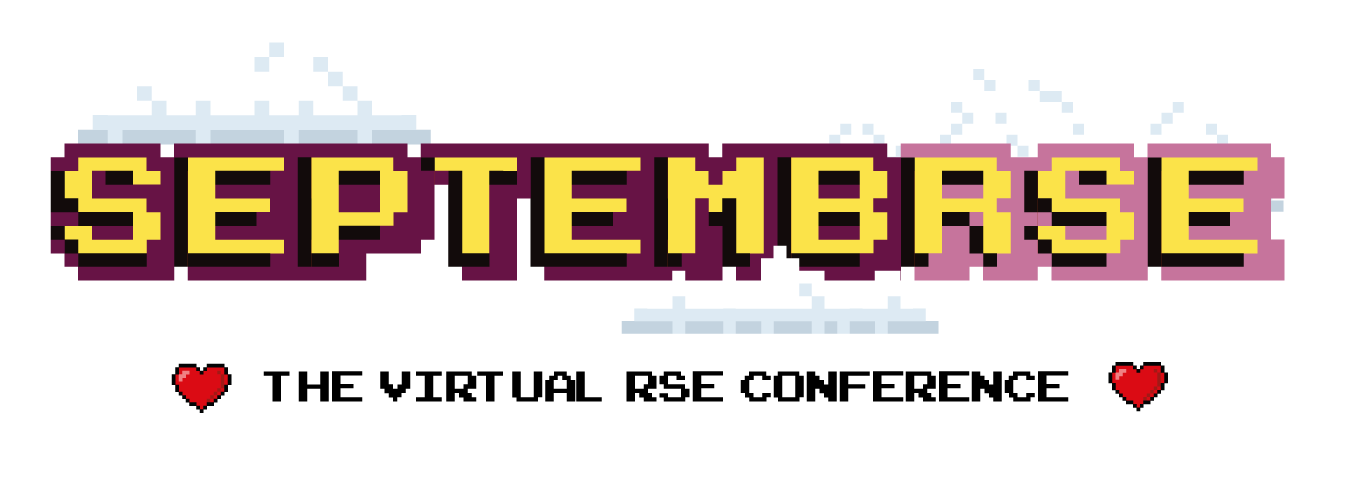SeptembRSE is a community conference intended for networking and collaboration in the RSE community. We value the participation of each and every member of our community and want all attendees to have an enjoyable, welcoming, and fulfilling experience. Accordingly, all attendees are expected to show respect and courtesy to other attendees throughout the conference and at all conference events, whether officially sponsored by UK RSE or not.
To make clear what is expected, all delegates/attendees, speakers, exhibitors, organisers and volunteers at any SeptembRSE event are required to conform to the UK RSE society’s Code of Conduct. Organisers and volunteers will enforce this code throughout the event and we will publish detailed policies and procedures for the enforcement of the Code of Conduct and reporting of misconduct closer to the event. We will also make a public (and anonymised) report of the number of incidents and outcomes present during the event (if any).
Given the online nature of SeptembRSE, we are expanding on the Code of Conduct to address issues related to being online, and issues related to working from a domestic setting. This following text acknowledges these issues and adds to the code of conduct we expect from all stakeholders (attendees, organizers and sponsors) of the conference.
Steps we/you can take to protect privacy
- Submissions to the calls should avoid containing any personally identifiable details other than in designated sections.
- Where possible, we will strive to also allow for anonymous questions and comments before and during an event. This anonymity is subject to active conformation to the Code of Conduct by all attendees.
- We intend to record all events held under the umbrella of this conference by recording the audiovisual feed of its events. By participating, stakeholders are allowing us to make such a recording and release them publicly on proprietary video hosting platform(s). Even though we would like to respect any privacy-related choices made by an individual, editing these recordings to remove identifying traits (face(s), voice(s) and backdrop(s) etc.) is beyond the roles of our small volunteering team, unless there is a very convincing reason to do so (in which case, please contact a member of our team). If you wish not to be recorded, kindly turn off your audiovisual feed (more on it below).
- We intend to provide closed-captioning during and after the conference using technology (including AI-assisted proprietary technologies beyond our direct control). By participating, stakeholders are allowing us to do so; both during and after the conference. If you wish not to participate in this, kindly turn off your audio feed and interact using other modes of communication (chat etc.).
- We consider it to be completely acceptable for any participant to keep their audio and/or video feed turned off during an event. One can also make it explicit that they are participating in a passive observer mode (by adding an ‘ob’ before their name in an event) and would, therefore, not be expected to use their audiovisual feed at all. Note that this also extends to presenters, who are also free to present audio only, with their cameras off. We require that attendees’ cameras and microphones are switched off for non-interactive presented sessions (e.g. talks, walkthroughs, discussions, panels). Audience participation will take place via the conference question and discussion system.
- Additionally, we expect that no one shall ask another person to switch-on these feeds beyond gentle reminders when required for fruitful participation. Refusals to switch-on the audio/visual feed must be accepted politely, immediately and with no-questions-asked.
- All events in the conference will be recorded and the recordings will be made available publicly for future use. Therefore, it is explicitly forbidden to make private recordings/take screenshots (of any kind) of an attendee by other attendee without their written permission with the following sole exception:
- We expect all oral, written, verbal and non-verbal communications to follow the Code of Conduct. However, if you deem that the code is being breached, you can make recordings or take screenshots to document the misbehaviour as evidence.
On working from a domestic environment
- We note that working from a domestic setting may entail shifting work patterns and additional care responsibilities among other things; making it more difficult than usual to commit to a week-long conference. Therefore, we are organizing SeptembRSE over a period of 4 weeks where the hope is that participants will be able to attend at least some, if not all, of the events of their liking.
- We expect attendees to refrain from commenting on the backdrop(s) of other attendees or on their use of virtual backdrops, even as a welcoming icebreaker. We appreciate the fact that many attendees would participate from a domestic environment (because they lack a choice) and highlight the fact that the video feed in a conference is not meant to be a window into someone’s private space.
- On the same note, we expect attendees to refrain from discussing pets and persons (e.g. children) that may appear in a video feed. It is okay (and welcome) if they are there in someone’s video feed, but it is not okay for other attendees to discuss this.
- High-speed internet connections and suitable computing hardware/software may not be readily available to everyone. This can make it difficult to present material, lead to poor communication because of dropped data packets as well as severely hinder attempts to follow a workshop/walkthrough or similar work-along events such as live-audience polls. To get around this, we expect all attendees to have patience and give some leeway to others.
Is something missing?
Have we neglected something you need, or is there something not mentioned here that would make your attendance possible, or improve your experience of the event? Please let us know. We’ll do what we can to provide it.
Please contact the accessibility and diversity chair, Shashank S Harivyasi at [email protected], to discuss any particular accessibility needs or diversity concerns you might have.
